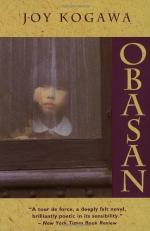|
This section contains 594 words (approx. 2 pages at 400 words per page) |

|
Cheng Lok Chua, "Witnessing the Japanese Canadian Experience in World War II. Processual Structure, Symbolism, and Irony in Joy Kogawa's Obasan," in Reading the Literatures of Asian America, edited by Shirley Geok-lin Lim and Amy Ling, Temple University Press, 1992, pp 97-108.
This essay highlights the ritual structure and the "ironic narrative mode" of Kogawa's novel Chua also contends that Obasan "puts an Ironic question to the Christian ethics professed by Canada's majority culture."
Andrew Garrod, interview with Joy Kogawa, in Speaking for Myself: Canadian Writers in Interview, Breakwater (St. Johns, Newfoundland), 1986, pp. 139-53.
A lengthy interview in which Kogawa speaks revealingly about her childhood, her theological and political convictions, and her writing, especially her writing of Obasan.
Gurleen Grewal, "Memory and the Matrix of History: The Poetics of Loss and Recovery in Joy Kogawa's Obasan and Toni Mornson's Beloved," in Memory and Cultural Politics. New...
|
This section contains 594 words (approx. 2 pages at 400 words per page) |

|




